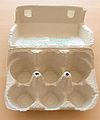Living hinge

A living hinge or integral hinge is a thin flexible hinge (flexure bearing) made from the same material as the two rigid pieces it connects.
Description
[edit]A living hinge or integral hinge is a thin flexible hinge (flexure bearing). It is made from the same material as the two rigid pieces it connects. It is typically thinned or cut to allow the rigid pieces to bend along the line of the hinge. The minimal friction and very little wear in such a hinge makes it useful in the design of microelectromechanical systems, and the low cost and ease of manufacturing makes them quite common in clamshell containers and other disposable, recyclable packaging.[1]
Plastic
[edit]Plastic living hinges are typically manufactured in an injection molding operation[2][3] that creates all three parts at one time as a single piece, and if correctly designed and constructed, it can remain functional over the life of the part. Thermoforming can also produce hinged products. Polyethylene and polypropylene are considered to be the best resins for living hinges, due to their excellent fatigue resistance.[4][5] Acrylonitrile butadiene styrene (ABS) is also common. [6]
Wood
[edit]
A variant on the kerf bend can be used to create living hinges in laser cut wood. The technique is popular for making light-duty hinges with large radii.[7] It is also possible to create a living wood joint by hand, but the result is less accurate.[8]
Gallery
[edit]-
A pulp egg carton using a living hinge
-
Bottle cap
-
A living hinge on the lid of a Tic Tac box.
See also
[edit]References
[edit]- ^ "Engineering Fundamentals: Living Hinge". Archived from the original on 2008-02-28. Retrieved 2008-02-26.
- ^ Sievers, R M (2005), SIMULATING THE POLYPROPYLENE FILLING OF A DISPENSING CLOSURE MOLD WITH INJECTION MOLDING SOFTWARE (PDF), 2005 IL/IN Sectional Conference: American Society for Engineering Education, archived (PDF) from the original on 19 May 2021, retrieved 18 May 2021
{{citation}}: CS1 maint: location (link) - ^ Kim, HS (2003). "Gate location design in injection molding of an automobile junction box with integral hinges" (PDF). Journal of Materials Processing Technology. 140 (1–3): 110–115. doi:10.1016/S0924-0136(03)00700-3. Archived (PDF) from the original on 19 May 2021. Retrieved 18 May 2021.
- ^ "Proto Labs 2014-12 Design Tips". Archived from the original on 2017-12-01. Retrieved 2017-11-21.
- ^ Dominic Muren (2005-08-15). "Hinges, both living and dead". Archived from the original on 2007-10-13. Retrieved 2008-02-26.
- ^ Gribbins, C (2014), EXPERIMENTAL ANALYSIS ON AN ADDITIVELY MANUFACTURED ABS LIVING HING (PDF), University of Texas,25th Annual International Solid Freeform Fabrication Symposium, pp. 1412–1424, archived (PDF) from the original on 18 May 2021, retrieved 17 May 2021
- ^ Sean Michael Ragan (2011-10-25). "Plywood Living Hinge Design for Laser Cutters".
- ^ "Cutting A Living Hinge". YouTube. Archived from the original on 2021-12-05.
External links
[edit]- Boxdesigner – The box above was original created with this webservice



